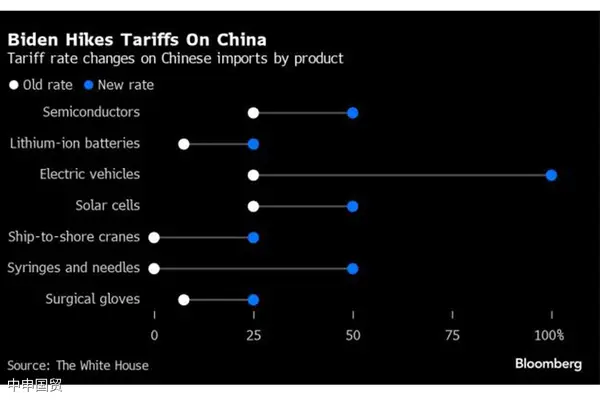- Shanghai Zhongshen International Trade Co., Ltd. - Two decades of trade agency expertise.
- Service Hotline: 139 1787 2118
Against the backdrop of increasing global trade tensions, the United States has taken measures to impose additional tariffs on 14 categories of Chinese goods. This policy change has attracted significant attention both at home and abroad. Katherine Tai, the United States Trade Representative, announced on May 14, 2024 that based on the results of the Section 301 review, tariffs on a series of key Chinese goods categories would be increased. This move aims to address challenges related to Chinas technology transfer, intellectual property, and innovation.

According to the statement in the announcement of the Office of the United States Trade Representative, the following is the specific list and details of the goods with newly added or increased tariffs:
Battery parts (non - lithium - ion batteries):The current tariff has been increased to 25%.
Electric vehicles:The tariff has been significantly increased from the current 25% to 100%.
Masks:The tariff will be increased to 25%.
Lithium - ion electric vehicle batteries:The tariff has been increased to 25%.
Lithium - ion non - electric vehicle batteries:The tariff will be increased to 25% in 2026.
Medical gloves:The tariff for this category of goods will be increased to 25% in 2026.
Natural graphite:The tariff will be increased to 25% in 2026.
Other critical minerals:The tariff has been immediately increased to 25%.
Permanent magnets:The tariff will be increased to 25% in 2026.
Semiconductors:The tariff will be increased to 50% in 2025.
Ship - to - shore cranes:The tariff has been immediately increased to 25%.
12、solarBatteries (whether assembled into modules or not):The tariff has been increased to 50%.
Steel and aluminum products:The tariff has been immediately increased to 25%.
Syringes and needles:The tariff will be increased to 50% in 2026.
This policy adjustment was made after a year - long review of the tariff policy. This review is a follow - up action to the tariffs imposed on approximately $300 billion worth of goods imported from China during the Trump administration. Tai emphasized that this adjustment is to protect the US technology industry and promote fair trade, while also responding to the demands of domestic industries for the continuation of these tariff actions.
The US government also announced that it will establish an exclusion process for equipment used in domestic manufacturing and has proposed 19 exclusion recommendations for specific solar manufacturing equipment. This indicates that the US will still provide flexibility in certain key areas when implementing these tariff policies.
In terms of countermeasures, the Office of the United States Trade Representative will strengthen cooperation with domestic private companies to combat technology theft and will allocate additional funds to the US Customs and Border Protection to enhance the enforcement of Section 301 actions. This series of measures demonstrates the USs strategic adjustments on the global trade stage and its strict management of trade policies.foreign tradeIn response, a spokesperson for the Chinese Ministry of Commerce expressed strong dissatisfaction and firm opposition at a press conference, believing that the USs actions seriously violate international trade rules and accusing the US of politicizing economic and trade issues. The Chinese side promised to take necessary measures to defend its rights and interests, which may mean that Sino - US trade relations will face further tensions.
Brazils cotton exports to China surged by 950%
Related Recommendations
? 2025. All Rights Reserved. 滬ICP備2023007705號-2  PSB Record: Shanghai No.31011502009912
PSB Record: Shanghai No.31011502009912









